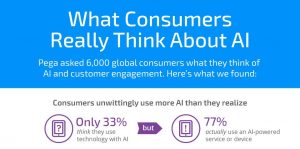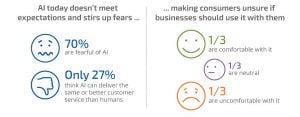People are confused about what artificial intelligence (AI) really does, resulting in misplaced fears that inhibit them from embracing AI-based technology, said a global study from American software firm Pegasystems.
Company surveyed its 6000 customers in six countries and found that businesses appear hesitant to fully embrace AI devices and services. “Only one in three (36 per cent) are comfortable with businesses using AI to engage with them – even if this typically results in a better customer experience. Almost three quarters (72 per cent) express some sort of fear about AI, with one quarter (24 per cent) of respondents even worried about robots taking over the world, said the study, adding that these fears are often eased once people gain firsthand AI experience.

“Though AI has been around for more than 30 years, it has now evolved to the point that businesses can engage with each individual consumer on a real-time, one-to-one basis. But our study suggests the recent hype is causing some confusion and fear among consumers, who may not really understand how it's already being used and helping them every day,” Don Schuerman, vice president, product marketing and CTO, Pegasystems said, adding that businesses need to focus on using AI to develop applications that provide real value for customers to improve their experiences rather than overhyping the technology itself.
Interestingly report says that people may be surprised to learn they are already exposed to much more AI than they realise. “Only 34 per cent of respondents thought they had directly experienced AI. But when asked about the technologies in their lives, the survey found 84 per cent actually use at least one AI-powered service or device – such as virtual home assistants, intelligent chatbots, or predictive product suggestions. When asked separately to identify AI-powered devices, only 41 perc ent knew Amazon's Alexa and Google Home run on AI,” says the study.

Is AI a fear of the unknown
Pegasystems said that these findings can be traced to a basic misunderstanding of AI by consumers. “Seventy-two percent confidently claimed they understand AI, but far fewer could correctly define what it is or what it can do. For example, relatively few knew AI has the basic ability to interpret or understand speech (37 per cent) or mimic humans (35 per cent), while only half could identify some of the most common AI capabilities, like solving problems (50 percent) and learning (57 percent),” said the report.
Demystifying AI
According to Pegasystems, these misperceptions are important because the study shows they have a negative effect on consumers' openness to using AI. The data shows consumers are significantly more comfortable with AI if they think they have previously been exposed to it. “Only one quarter (25 per cent) of the people who report no AI experience feel at ease with businesses using AI to engage with them. But for AI veterans, this number jumps to 55 per cent – a full 30 points higher,” said the study.

Signs of optimism for AI
Pegasystems said, somewhat contradictory to all of this, consumers also express optimism in the power of AI. “Nearly 70 per cent say they want to experience more AI if it will help make their lives easier,” said the report.
Taken together, the survey results suggest businesses should be more transparent about the fair and pragmatic use of AI in their products and services. Companies should find non-threatening ways to expose customers to its benefits to change their misperceptions and establish trust and comfort over time, said Pegasystems.

The survey also highlighted some differences by gender and generation. For example – more men think they understand what AI is (80 per cent) than women (66 per cent). However, more women correctly identified that Siri (60 per cent) and Alexa (43 per cent) are powered by AI than men (54 per cent and 38 per cent, respectively).
While those 55 and older are generally less comfortable with AI than millennials (ages 18-24), they are also surprisingly less fearful of AI consequences – 30 percent of baby boomers expressed no fears compared to 22 percent of millennials.
The report surveyed consumers across the US, Britain, France, Germany, the Netherlands, and Australia.







